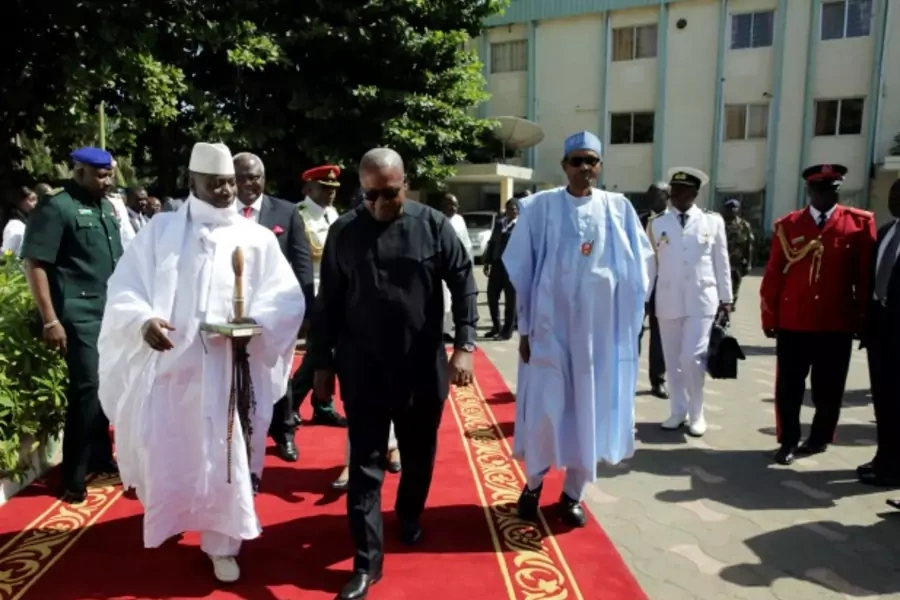More on:
This is a guest post by Mohamed Jallow, an Africa watcher, following politics and economic currents across the continent. He works at RTI International in Research Triangle Park, North Carolina.
The Gambia is in a political crisis. The country’s longtime strongman, President Yahya Jammeh lost his bid for re-election to a fifth term earlier this month. After initially conceding defeat, he is refusing to step down. Citing irregularities on the part of the Electoral Commission, Jammeh has rejected the results, and is calling for fresh elections.
Reminiscent of the post-electoral crisis in the Ivory Coast a few years ago, the Gambia is risking a jealously guarded reputation for peace and tranquility in a region fraught with political turmoil. Unless cooler heads prevail, and Jammeh respects the will of the Gambian people, the country is in for a wild ride.
The Key Players
The Incumbent: President Yahya Jammeh has ruled this small country for twenty-two years. He came to power through a bloodless military coup in 1994, ousting the country’s post-independence president, Sir Dawda Jawara. Styling himself and his group as “soldiers with a difference,” Jammeh quickly returned the country to nominal civilian rule with himself at the helm.
Known for the eccentric, President Jammeh claims to have a cure for HIV/AIDS and once vowed to kill homosexuals. To the Gambian population, the stifling of opposition and dissent, arbitrary detentions and disappearances, and the all-around limited space for political activism has driven many people into exile.
The Opposition Coalition: The opposition, long in the wilderness due to the harsh tactics of the Jammeh regime finally joined forces under a coalition that gave Jammeh a run for his money. With the core of its leadership jailed after protests earlier in the year, the consensus candidate was Adama Barrow; a little-known businessman that no one had heard of. As it turned out, that was a genius move. He went on to win the elections, though by a slim margin, surprising everyone, including Jammeh himself.
The Army: The Gambian Army has so far remained loyal to Yahya Jammeh, and has shown no signs of abandoning him. As the strongest institution in the country, the loyalty of the army has been a key factor in Jammeh’s twenty-two year rule. The way this political crisis ends will determine the future of the Gambian Army, especially its leadership, and it will be a litmus test as to where their loyalties lie—to their country, or to an individual.
ECOWAS: When the political crisis started in the Gambia, the Economic Community of West African States (ECOWAS) quickly sprang into action to avert an all-out crisis. A delegation headed by its current chair, Liberia’s President Ellen Johnson Sirleaf, along with Presidents Muhammadu Buhari of Nigeria, John Mahatma of Ghana, and Earnest Bai Koroma of Sierra Leone flew to the Gambia to encourage Jammeh to accept the results of the elections. Their efforts have so far failed, and ECOWAS is now considering additional steps to force Jammeh out of power.
Senegal: Senegal is Gambia’s only neighbor, wielding significant influence on the politics and economy of the country. Jammeh and Senegal have never gotten along, and a number of blockades and boycotts since he came to power have stifled economic activities between the two countries. With Senegal and most of the world now backing the coalition, Jammeh’s options are getting very limited. Whatever decision ECOWAS takes, Senegal is sure to play a significant role.
The Key Date
January 18, 2017 will be the key date in the Gambia. That is the date Jammeh’s mandate officially ends. The opposition is planning to inaugurate President-elect Adama Barrow as the new president of the Gambia, and West African leaders have vowed to attend his inauguration. Will Jammeh allow Barrow to be sworn in as the new president of the Gambia? Will he allow other West African leaders landing rights to attend Barrow’s inauguration? Will Senegal and West Africa intervene to forcefully remove Jammeh? These are critical questions that will determine the future of the Gambia come January 18, 2017.
The Way Forward
Since independence in 1965, The Gambia has been a quiet and peaceful oasis in a tumultuous region—a fact that many of the nation’s two million people have guarded jealously. With this political impasse, the country risks sliding into an all-out conflict. The defeated president must hand over power to the elected president as he initially promised to do come inauguration day in January. Anything short of that will be devastating for the Gambia.
More on:
 Online Store
Online Store
